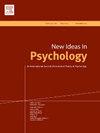Personality and doomscrolling: The mediating role of fear of missing out in an Eastern context
IF 2.9
3区 心理学
Q2 PSYCHOLOGY, EXPERIMENTAL
引用次数: 0
Abstract
Doomscrolling refers to the compulsive engagement with distressing news content online and is linked to negative psychological outcomes. Guided by the Stressful Media Consumption Framework and Compensatory Internet Use Theory, this study examined whether fear of missing out (FoMO) explains the association between Big Five personality traits and doomscrolling. FoMO has been theorized as an affective mechanism that may link emotional instability to maladaptive media engagement, yet its role in doomscrolling remains underexplored, particularly in Eastern contexts. Data were collected from 331 Indian social media users (aged 18–40) who completed validated measures of personality, FoMO, and doomscrolling. Correlation analyses indicated that neuroticism, agreeableness, conscientiousness, and FoMO were significantly associated with doomscrolling. Multiple regression showed that FoMO had the largest standardized association with doomscrolling, followed by neuroticism (positive), agreeableness (negative), and conscientiousness (negative). Mediation analysis indicated that the indirect association between neuroticism and doomscrolling via FoMO was significant, whereas the direct association was not significant. These results suggest that FoMO may be one relevant affective factor connecting personality particularly emotional instability to compulsive news consumption. Our findings suggest that people high in neuroticism may doomscroll more when they feel they are missing out on information.
个性和末日卷轴:在东方语境中害怕错过的中介作用
“末日滚动”指的是强迫性地阅读网上令人痛苦的新闻内容,并与负面心理结果有关。在压力媒体消费框架和补偿性互联网使用理论的指导下,本研究调查了错过恐惧(FoMO)是否解释了五大人格特征与末日卷轴之间的联系。FoMO被理论化为一种情感机制,可能将情绪不稳定与不适应媒体接触联系起来,但它在末日卷轴中的作用仍未得到充分探讨,尤其是在东方背景下。数据收集自331名印度社交媒体用户(18-40岁),他们完成了人格、FoMO和末日卷轴的有效测量。相关分析表明,神经质、宜人性、尽责性和FoMO与末日卷轴显著相关。多元回归显示,FoMO与doomscroll的标准化关联最大,其次是神经质(正相关)、宜人性(负相关)和尽责性(负相关)。中介分析表明,神经质与FoMO厄运卷轴的间接关联显著,而直接关联不显著。这些结果表明,FoMO可能是将人格(尤其是情绪不稳定)与强迫性新闻消费联系起来的一个相关情感因素。我们的研究结果表明,当高度神经质的人感到自己错过了信息时,他们可能会更多地陷入厄运。
本文章由计算机程序翻译,如有差异,请以英文原文为准。
求助全文
约1分钟内获得全文
求助全文
来源期刊

New Ideas in Psychology
Multiple-
CiteScore
4.80
自引率
3.80%
发文量
37
期刊介绍:
New Ideas in Psychology is a journal for theoretical psychology in its broadest sense. We are looking for new and seminal ideas, from within Psychology and from other fields that have something to bring to Psychology. We welcome presentations and criticisms of theory, of background metaphysics, and of fundamental issues of method, both empirical and conceptual. We put special emphasis on the need for informed discussion of psychological theories to be interdisciplinary. Empirical papers are accepted at New Ideas in Psychology, but only as long as they focus on conceptual issues and are theoretically creative. We are also open to comments or debate, interviews, and book reviews.
 求助内容:
求助内容: 应助结果提醒方式:
应助结果提醒方式:


